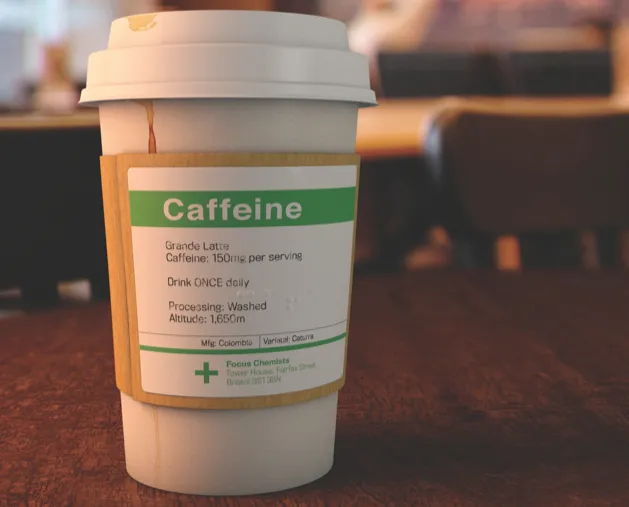Most of us reach sleepily for a morning cup of tea or coffee to set us up for the day. Yet research suggests that a hit of caffeine does little more than reverse the effects of withdrawal after a night’s abstinence, in much the same way that heroin addicts eventually take the drug simply to avoid the horrors of going cold turkey. Recently, new research has looked at the effects of caffeine and is questioning whether it’s more dangerous than we think.

"What is clear is that habitual use – even one cup of tea per day – leads to withdrawal after a period of abstinence. A well-known side-effect of withdrawal is sleepiness, which can be reversed by ingestion of the drug,” says Michael Keane from Dublin City University.
The shape of the caffeine molecule is similar to that of adenosine, which suppresses activity in the central nervous system. Adenosine receptors are found throughout the body, and when adenosine binds to them it inhibits the release by neurones of several neural transmitters, produces sedation and has anti-convulsant activity. Caffeine is an adenosine antagonist, which means that it binds to the receptors but without reducing neural activity.
Caffeine’s effects are difficult to study because different people have varying levels of tolerance. If you regularly consume medium to high levels you’ll become far less sensitive to it. Although caffeine may help to keep us awake and gives small improvements in physical performance, it causes jitteriness and anxiety in some people and raises blood pressure by causing blood vessels to narrow. During withdrawal, the blood vessels widen again, which increases blood flow to the brain and causes headaches. In the absence of caffeine, withdrawal effects lessen within a few days, and disappear after about a week.
When a team of psychologists from the University of Bristol set caffeine users and non-users a range of tasks to measure the effects of overnight caffeine abstinence, they discovered that by 10.30am, those used to a morning dose of caffeine were starting to suffer mildly from withdrawal. By the afternoon, effects became more severe, with sleepiness, lower mental alertness and poorer performance on reaction and memory tasks.
Caffeine improved reaction times but did not improve mental performance. Although caffeine makes medium-high consumers ‘faster’, they are not ‘smarter’, argues the Bristol team. Tolerance to caffeine’s effects on sleepiness means that “frequent consumption fails to enhance mental alertness and mental performance,” suggest the researchers.
Strangely, caffeine had little effect on non-consumers, apart from making them feel less sleepy. “I puzzled for a long time why caffeine wasn’t increasing alertness in non-consumers – it seemed odd,” recalls lead researcher Prof Peter Rogers. The key lay in separating alertness – the ability to focus mentally on a task – from wakefulness, which hadn’t really been done before. Rogers worked out that caffeine wasn’t improving alertness in non- and low-consumers because any positive effects were being cancelled out by jitteriness and anxiety.
Rogers largely gave up caffeine several years ago, though he occasionally drinks coffee to keep him awake on long car journeys. “Every time I go through withdrawal again,” he says, “it still takes me slightly by surprise.”
A dangerous habit?
Too much caffeine can speed up the heart, or cause abnormal heart rhythms. Very large amounts can be toxic and extreme overdose can cause death. An average adult would need to drink about 100 cups of coffee in a day for this to happen, but even smaller amounts can have negative effects. A study of almost 45,000 people between 1979 and 1998 by the University of Queensland, Australia, suggests that men who drank 28 cups of coffee per week were 56 per cent more likely to die from all causes before the age of 55, while women more than doubled their risk of mortality. Lead researcher Carl Lavie acknowledges that more research is needed, but in the meantime advises moderation.

The US Food and Drug Administration (FDA) and the European Food Safety Authority (EFSA) are both investigating the safety of caffeine. The FDA is acting in response to the addition of caffeine to an increasing number of products, while EFSA was asked by the European Commission to give advice on the risk of adverse health effects as a result of caffeine intake ‘from all sources’. Although caffeine is found in a wide range of products, including chocolate, the greatest concerns surround energy drinks, the fastest-growing sector of the UK drinks market since 2004, according to a report for the UK Food Standards Agency by its Committee on Toxicity (COT). A typical energy drink contains about 80 milligrams (mg) of caffeine per 250ml can. This compares with 60-80mg of caffeine in an average (237ml) cup of instant coffee and up to 135mg per cup of filter coffee. A can of cola contains 30–45mg of caffeine.
Caffeine has a half-life in the body of about five hours, but can hang around for up to 30 hours in certain cases, including in women taking oral contraceptives, pregnant women and young children. These groups are more susceptible to the effects of caffeine toxicity, explains Alan Crozier from the University of Glasgow’s School of Medicine.
In the UK and US, pregnant women are advised to keep daily caffeine consumption below 200mg per day, equating to about three cups of instant coffee. Recent research at Sahlgrenska Academy, Sweden, based on data from over 59,000 women who took part in the Norwegian Mother and Child Cohort Study, suggests that caffeine may cause decreased birth weight.
Health Canada, the national public health organisation, has recommended that children aged between 10 and 12 years have a maximum caffeine intake of 85mg per day. With just one can of energy drink taking children to this level, concerns are rising over their consumption. A recent Swiss study on rats suggests that caffeine delays brain development during puberty by reducing deep sleep.
Energy drinks aren’t just dangerous for children, however. They are commonly mixed with alcohol to give a phenomenon of being ‘wide-awake drunk’, reports the COT. The theory is that caffeine prevents people from realising just how intoxicated they really are and extends drinking time. In 2010, the FDA worked to withdraw caffeinated alcoholic beverages from the market, largely because of studies suggesting that ingesting caffeine and alcohol together may lead to ‘life-threatening situations’.
From December 2014, drinks containing more than 150mg per litre of caffeine – other than tea or coffee – will have to be labelled in the EU as having ‘high caffeine content. Not recommended for children or pregnant or breast-feeding women’. Yet there are no legal restrictions on the amount of caffeine that may be present.
How much is too much?
So why isn’t caffeine labelled in absolute terms, in the same way as sugars or salt? People vary so much in their reactions to caffeine that a maximum figure could not be produced, says Richard Laming from the British Soft Drinks Association. “Even if there was a recommended intake, the proportion coming from soft drinks is small compared with that from tea and coffee.” With tea and coffee, the caffeine content varies widely from cup to cup so would be nigh on impossible to label.
Glasgow’s Alan Crozier has analysed espresso coffees purchased in cafés to reveal a six-fold difference in caffeine levels. The most caffeine in a single espresso was 322mg, while a further three contained over 200mg. Some of the differences come from levels of roasting – more intense roasting decreases caffeine levels, says Crozier.
Some of us may find it easier to limit caffeine consumption than others. “We have known for a long time that people’s consumption of drugs, including caffeine, has a genetic basis,” says Marcus Munafo, a University of Bristol psychologist. Using new genetic technology, the team is starting to identify genetic variants that account for differing levels of consumption. “We have been looking at specific genetic variants and using more precise measures of how much caffeine people consume,” he says. The aim is to find genetic markers for caffeine consumption and to see if they predict the risk of conditions like cardiovascular disease or stroke.
“Questions remain about the effects of dietary caffeine – that is, what effects are present at normal levels of consumption,” says Michael Keane. “For example, should caffeine be considered a risk factor in cardiovascular disease, given the evidence that we may not develop a tolerance to the blood pressure effects of the drug?”
While it’s unlikely to kill you, caffeine clearly can have negative effects on the body. If you’re worried about those effects, perhaps now is a good time to renounce, or at least reduce, your daily dose.
Emma Davies is a science journalist with a PhD in food science
Follow Science Focus onTwitter,Facebook, Instagramand Flipboard